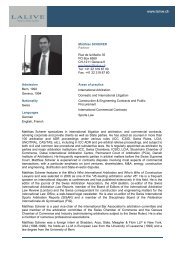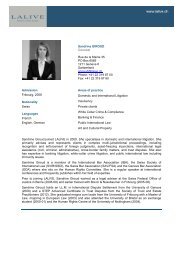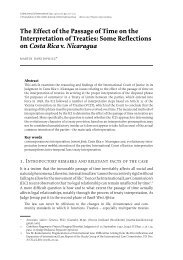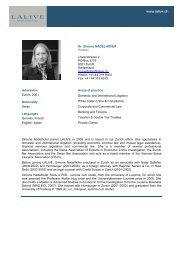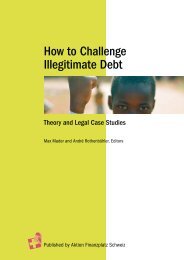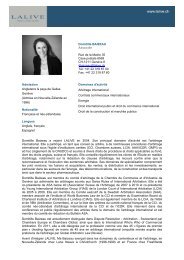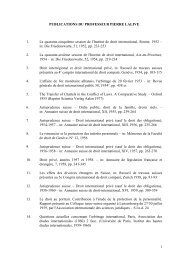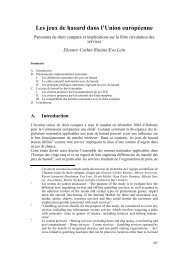the presentation of Ms Baizeau - Lalive
the presentation of Ms Baizeau - Lalive
the presentation of Ms Baizeau - Lalive
Create successful ePaper yourself
Turn your PDF publications into a flip-book with our unique Google optimized e-Paper software.
Arbitration and insolvency<br />
Applicable law and general issues<br />
in light <strong>of</strong> <strong>the</strong> Vivendi decisions<br />
Domitille <strong>Baizeau</strong> ASA Groupe Genevois 18 June 2009
Insolvency<br />
Insolvent<br />
party<br />
Trustee<br />
TERMINOLOGY USED<br />
Liquidation, bankruptcy (voluntary or<br />
compulsory)<br />
Re-organisation proceedings<br />
(i.e. legal insolvency)<br />
Debtor, party subject to insolvency<br />
proceedings<br />
i.e. company in liquidation, under<br />
administration, or personal bankrupt (as<br />
Claimant or Respondent)<br />
Liquidator, administrator, receiver<br />
2
POSSIBLE SCENARIOS<br />
Claimant and Respondent parties to an arbitration<br />
agreement<br />
Claimant or Respondent subject to insolvency<br />
proceedings<br />
At different points in time “X”<br />
X Arbitration X Start <strong>of</strong> X Award X<br />
agreement<br />
arbitration<br />
3
WHY MAY INSOLVENCY INTERFERE WITH<br />
ARBITRATION ?<br />
Different policy objectives<br />
<br />
<br />
<br />
<br />
Insolvency: equality <strong>of</strong> creditors (centralised claims), rescue <strong>of</strong><br />
creditor, state control<br />
Arbitration: party autonomy, upholding arbitration agreement,<br />
certainty <strong>of</strong> transactions<br />
Leading to specific solutions<br />
Substantive and procedural provisions <strong>of</strong> insolvency law<br />
→ which may impact on arbitration agreement and/or arbitral<br />
proceedings<br />
Arbitral Tribunal has no lex fori and applies different national<br />
laws<br />
→ Not necessarily insolvency law<br />
4
HOW MAY INSOLVENCY<br />
INTERFERE WITH ARBITRATION ? (1)<br />
Potential impact <strong>of</strong> insolvency law<br />
… on arbitration agreement<br />
Arbitration agreement entered into by insolvent party without<br />
approval <strong>of</strong> all creditors and/or insolvency courts<br />
Arbitration agreement “null and void” ipso facto upon opening<br />
<strong>of</strong> insolvency under insolvency law<br />
Trustee “opts out” <strong>of</strong> arbitration agreement with approval <strong>of</strong><br />
insolvency courts<br />
Arbitration agreement voidable transaction and set aside by<br />
insolvency courts<br />
5
HOW MAY INSOLVENCY<br />
INTERFERE WITH ARBITRATION? (2)<br />
… on arbitral proceedings<br />
No “authority” <strong>of</strong> insolvent party to commence / continue<br />
arbitration under insolvency law<br />
Insolvency courts issue “anti-arbitration injunction”<br />
Insolvent party requires stay <strong>of</strong> arbitration<br />
Trustee asks for time to review file / file submissions or wants<br />
to appoint new arbitrator<br />
Insolvent party cannot pay advance on costs<br />
Non-insolvent party applies for security for costs<br />
6
HOW MAY INSOLVENCY<br />
INTERFERE WITH ARBITRATION? (3)<br />
… on underlying claim<br />
Non-insolvent party’s monetary claim not arbitrable under<br />
insolvency law<br />
… on arbitral award<br />
Order for payment <strong>of</strong> money against insolvent party<br />
prohibited under insolvency law<br />
Award against defaulting insolvent party not enforceable in<br />
insolvency<br />
Award contested by o<strong>the</strong>r creditors<br />
Claim not registered in <strong>the</strong> insolvency proceedings<br />
7
HOW TO RECONCILE<br />
INSOLVENCY AND ARBITRATION?<br />
No obvious solutions because:<br />
Few international instruments<br />
EC Regulation 1346/2000<br />
<br />
NY Convention: limited solutions<br />
Variety <strong>of</strong> insolvency and arbitration laws<br />
Variety <strong>of</strong> rules on conflict <strong>of</strong> laws<br />
→ No uniform approach by state courts<br />
→ No uniform approach by arbitrators<br />
Key issue:<br />
which law applies to <strong>the</strong> particular issue?<br />
8
THE VIVENDI / ELEKTRIM SCENARIO (1)<br />
Basic facts<br />
Dispute essentially between French company, Vivendi<br />
Universal SA (Vivendi) v Polish company, Elektrim SA<br />
(Elektrim)<br />
Dispute over ownership <strong>of</strong> shares in PTC, a large Polish<br />
mobile telecommunication company<br />
Several arbitral and court proceedings in various jurisdictions<br />
9
THE VIVENDI / ELEKTRIM SCENARIO (2)<br />
Facts in English case<br />
Third Investment Agreement pursuant to which Vivendi was<br />
to acquire an interest in PTC, allegedly breached by Elektrim<br />
by interfering with, or failing to secure, such interest<br />
Arbitration clause: LCIA Arbitration, London<br />
Arbitration commenced in Aug 2003 (liability hearing fixed in<br />
Oct 2007).<br />
10
THE VIVENDI / ELEKTRIM SCENARIO (3)<br />
Facts in Swiss case<br />
Alleged breach by Elektrim <strong>of</strong> an (unsigned) “Settlement<br />
Agreement” entered into in Mar 2006<br />
Arbitration clause: ICC Geneva<br />
Arbitration commenced in Apr 2006<br />
Hearing on liability scheduled after Aug 2007<br />
11
THE VIVENDI / ELEKTRIM SCENARIO (4)<br />
Bankruptcy <strong>of</strong> Elektrim<br />
21 Aug 2007: bankrupcy <strong>of</strong> Elektrim<br />
<br />
<br />
<br />
By order <strong>of</strong> <strong>the</strong> Warsaw court<br />
On Elektrim’s own petition<br />
Elektrim’s management retained control over assets and<br />
conduct <strong>of</strong> its affairs under supervision<br />
22 Aug 2007: LCIA Tribunal informed<br />
5 Sept 2007: ICC Tribunal informed<br />
Feb 2008: revocation <strong>of</strong> Elektrim’s self administration status<br />
by Warsaw court<br />
12
THE VIVENDI / ELEKTRIM SCENARIO (5)<br />
Elektrim’s plea<br />
Elektrim argues lack <strong>of</strong> jurisdiction <strong>of</strong> arbitral tribunal in both<br />
cases<br />
Elektrim relies on Art. 142 <strong>of</strong> <strong>the</strong> Polish Bankruptcy and<br />
Reorganisation Law:<br />
“Any arbitration clause concluded by <strong>the</strong> bankrupt<br />
shall lose its legal effect as at <strong>the</strong> date bankruptcy<br />
is declared and any pending arbitration proceedings<br />
shall be discontinued ”<br />
13
THE VIVENDI / ELEKTRIM DECISIONS (1)<br />
March 2008 LCIA arbitration partial award<br />
<br />
<br />
English law governs effects <strong>of</strong> Polish bankruptcy order<br />
Tribunal has jurisdiction<br />
July 2008 ICC Arbitration partial award<br />
<br />
<br />
Polish law governs effect <strong>of</strong> Polish bankruptcy order<br />
Tribunal does not have jurisdiction<br />
October 2008 English High Court decision<br />
<br />
Partial award upheld<br />
March 2009 Federal Supreme Court decision<br />
<br />
Partial award upheld<br />
14
THE VIVENDI / ELEKTRIM DECISIONS (2)<br />
Issues<br />
Effect on pending arbitration in London and in Geneva if a<br />
party enters into insolvency in Poland?<br />
Depends on which law governs <strong>the</strong> impact <strong>of</strong> insolvency<br />
on <strong>the</strong> arbitration: Polish law or English/Swiss law?<br />
English case: turned on interpretation <strong>of</strong> EC Regulation<br />
Swiss case: turned on characterisation <strong>of</strong> effect <strong>of</strong> Polish law<br />
15
THE VIVENDI / ELEKTRIM English decision (1)<br />
Key principles <strong>of</strong> EC Regulation<br />
Ensure effective and efficient management <strong>of</strong> insolvency<br />
proceedings within internal market (no forum shopping)<br />
Universality: automatic recognition and effect <strong>of</strong> insolvency<br />
proceedings in an EU member state [Poland] in all o<strong>the</strong>r EU<br />
member states [including England] (Preamble para 22 & Art.<br />
16 and 17)<br />
Application <strong>of</strong> [Polish] insolvency law to such effects<br />
(Preamble para 23 & Art. 4)<br />
16
THE VIVENDI / ELEKTRIM English decision (2)<br />
Art. 4.1:<br />
Relevant provisions <strong>of</strong> EC Regulation<br />
Save as o<strong>the</strong>rwise provided in this Regulation, <strong>the</strong> Law<br />
applicable to insolvency proceedings and <strong>the</strong>ir effects shall<br />
be that <strong>of</strong> <strong>the</strong> Member State within <strong>the</strong> territory <strong>of</strong> which such<br />
proceedings are opened [Poland]<br />
Art. 4.2:<br />
[Polish law] shall determine in particular:<br />
(e) The effects <strong>of</strong> insolvency proceedings on current<br />
contracts to which <strong>the</strong> debtor [Elektrim] is party<br />
(f) The effects <strong>of</strong> <strong>the</strong> insolvency proceedings on proceedings<br />
brought by individual creditors [Vivendi], with <strong>the</strong> exception <strong>of</strong><br />
lawsuits pending<br />
17
THE VIVENDI / ELEKTRIM English decision (3)<br />
Relevant provisions <strong>of</strong> EC Regulation<br />
Exceptions so as to protect legitimate expectations and<br />
certainty <strong>of</strong> transactions (Preamble para 24)<br />
Conflict <strong>of</strong> laws rules set out in Art. 5 to 15<br />
Art. 15:<br />
The effects <strong>of</strong> insolvency proceedings on a lawsuit pending<br />
concerning an asset or a right <strong>of</strong> which <strong>the</strong> debtor [Elektrim]<br />
has been divested shall be governed solely by <strong>the</strong> law <strong>of</strong> <strong>the</strong><br />
Member State in which that lawsuit is pending [England]<br />
.<br />
Issue: how to reconcile Art. 4.2(e) with 4.2(f) & 15?<br />
18
THE VIVENDI / ELEKTRIM English decision (4)<br />
Decision<br />
Is <strong>the</strong> reference to arbitration a “lawsuit pending”?<br />
Yes<br />
Covers all types <strong>of</strong> action, but not execution<br />
Covers arbitration as well as court proceedings<br />
Is <strong>the</strong> arbitration agreement a “current contract”?<br />
Yes, ins<strong>of</strong>ar as it relates to any future, i.e. non pending,<br />
proceedings (4.2(e))<br />
But no, ins<strong>of</strong>ar as it relates to pending arbitrations (4.2(f) &<br />
15)<br />
All questions affecting “whe<strong>the</strong>r arbitration shall remain<br />
pending”, incl. status <strong>of</strong> arbitration agreement, to be determined<br />
by reference to Art. 15<br />
English law applies<br />
19
THE VIVENDI / ELEKTRIM English decision (5)<br />
Some questions & comments<br />
Which law <strong>of</strong> <strong>the</strong> seat applies under Article 15? (different<br />
approaches; Austria/UK)<br />
Which provisions <strong>of</strong> English law would apply if issue framed<br />
as one <strong>of</strong> legal capacity (as an issue affecting “whe<strong>the</strong>r<br />
arbitration shall remain pending”)?<br />
What if <strong>the</strong> seat had been in Poland and <strong>the</strong> insolvency in<br />
England?<br />
What if <strong>the</strong> arbitration agreement had been governed by<br />
Polish law? (para. 76 <strong>of</strong> decision)<br />
20
THE VIVENDI / ELEKTRIM Swiss decision (1)<br />
Key principles<br />
Underlying premise: only issue is Elektrim’s capacity to be<br />
party to an arbitration<br />
PIL Act deals with issue <strong>of</strong> capacity <strong>of</strong> state entities parties to<br />
arbitration (Art. 177), but silent for private entities<br />
Issue <strong>of</strong> legal capacity <strong>of</strong> private entities to be party to<br />
arbitration determined through general Swiss conflict <strong>of</strong> laws<br />
rules:<br />
Art. 154 PIL Act (law applicable companies) and 155(c)<br />
PIL Act (capacity <strong>of</strong> companies) apply<br />
Art 178(2) PIL Act (validity <strong>of</strong> arbitration agreement)<br />
does not apply<br />
21
THE VIVENDI / ELEKTRIM Swiss decision (2)<br />
In this instance<br />
Elektrim is a Polish corporation: Polish law applies – Polish<br />
law also corresponds to insolvency law<br />
Art. 142 <strong>of</strong> Polish insolvency law removed legal capacity <strong>of</strong><br />
Elektrim to be a party to arbitration<br />
No reason to doubt statements and legal interpretation <strong>of</strong> Art.<br />
142 by Arbitral Tribunal based on opinions <strong>of</strong> Polish law<br />
pr<strong>of</strong>essors (para 3.3 <strong>of</strong> decision)<br />
22
THE VIVENDI / ELEKTRIM Swiss decision (3)<br />
Some questions & comments<br />
Difficult case: oral hearing, majority 3 to 2<br />
Can <strong>the</strong> characterisation <strong>of</strong> <strong>the</strong> effects <strong>of</strong> Art. 142 on<br />
Elektrim’s capacity be questioned? (see paras. 3.1 and 3.3)<br />
Is <strong>the</strong> decision bad for arbitration in Switzerland?<br />
Are parties likely to file for bankruptcy when seat <strong>of</strong><br />
arbitration is in Switzerland to avoid liability?<br />
Are parties likely to avoid Switzerland as a seat <strong>of</strong><br />
arbitration?<br />
23
CONCLUSIONS ON APPLICABLE LAW (1)<br />
Provisions <strong>of</strong> insolvency law applicable:<br />
If mandatory or part <strong>of</strong> public policy <strong>of</strong> law <strong>of</strong> <strong>the</strong> seat:<br />
<br />
<br />
<br />
Insolvency in country <strong>of</strong> <strong>the</strong> seat?<br />
Insolvency and seat in EU (EC Regulation) with<br />
exceptions, including pending arbitration (Art. 15)<br />
Judgement <strong>of</strong> insolvency recognised in country <strong>of</strong> <strong>the</strong><br />
seat?<br />
If issue legal capacity (governed by relevant insolvency law)?<br />
With exception outside EU?<br />
To satisfy due process and notice requirements (Trustee)<br />
If non compliance:<br />
risk <strong>of</strong> annulment and/or unenforceable award<br />
24
CONCLUSIONS ON APPLICABLE LAW (2)<br />
Provisions <strong>of</strong> insolvency law taken into account:<br />
If law <strong>of</strong> <strong>the</strong> (possible) place <strong>of</strong> enforcement<br />
Not binding but may be requested by non-insolvency party<br />
Solutions adopted in practice by arbitral tribunals<br />
depend on:<br />
Characterisation <strong>of</strong> issues<br />
Applicable law<br />
Parties’ good faith and requirements<br />
25
CHECK LIST<br />
For arbitrators<br />
Pause to consider impact <strong>of</strong> insolvency<br />
Assess what insolvency law really provides<br />
Check authority<br />
Notify Trustee<br />
Identify potential issues<br />
Applicable law(s)<br />
Validity <strong>of</strong> arbitration<br />
agreement<br />
Procedural issues for<br />
both parties<br />
Costs<br />
Even if insolvency law not<br />
binding, assess<br />
Parties’ good faith<br />
Parties’ interests<br />
Parties’ requirements<br />
Impact on<br />
enforcement<br />
26
CHECK LIST<br />
Counsel for <strong>the</strong> non-insolvent party<br />
Impact <strong>of</strong> insolvency on:<br />
Arbitration<br />
Authority <strong>of</strong> insolvent<br />
party<br />
Capacity<br />
Validity <strong>of</strong> arbitration<br />
agreement<br />
Creditor’s claim<br />
Enforcement issues<br />
Advantage <strong>of</strong> insolvency<br />
proceedings<br />
Procedural requirements<br />
Steps required in arbitration?<br />
Stay<br />
New relief<br />
Security for costs<br />
27
CHECK LIST<br />
Counsel for <strong>the</strong> insolvent party<br />
Power <strong>of</strong> re<strong>presentation</strong><br />
Legal costs covered<br />
Impact <strong>of</strong> insolvency on<br />
arbitration:<br />
Authority to start /<br />
continue<br />
Capacity<br />
Validity <strong>of</strong> arbitration<br />
agreement<br />
New arbitration<br />
Advance on costs<br />
Pending arbitration<br />
Notification<br />
Stay<br />
Composition <strong>of</strong> Tribunal<br />
Time to file new<br />
submissions<br />
28



